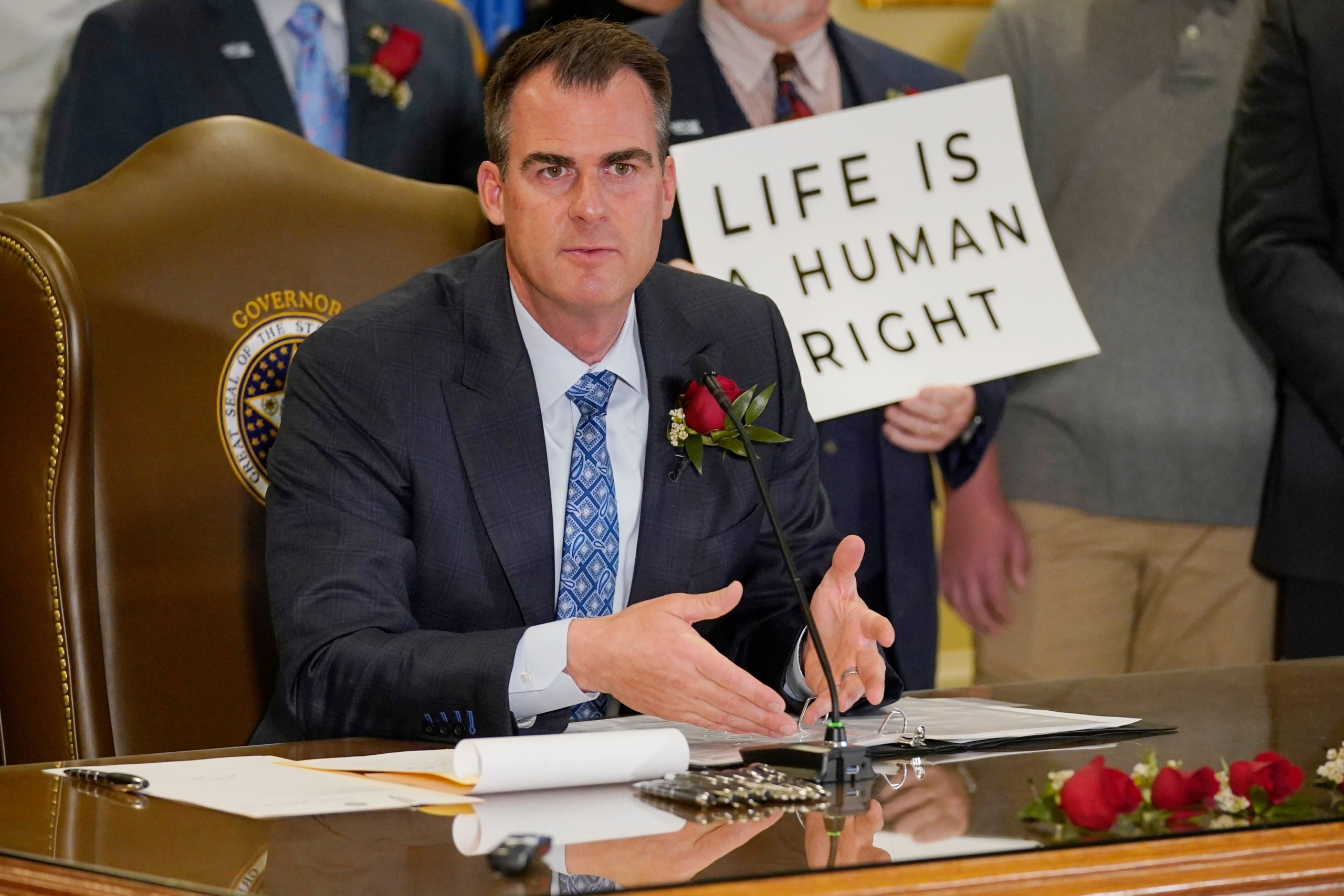Senior Gender Reporter, HuffPost
Oklahoma is now the state with the most restrictive abortion legislation in the country after Gov. Kevin Stitt (R) signed a total abortion ban on Wednesday.
“I promised Oklahomans that as governor I would sign every piece of pro-life legislation that came across my desk and I am proud to keep that promise today,” Stitt said in a statement.
The bill, H.B. 4327, bans abortion at fertilization and has the same enforcement mechanism as Texas’ six-week abortion ban that went into effect last fall. The law defines an unborn child as “a human fetus or embryo in any stage of gestation from fertilization until birth” and went into effect immediately after signing.
The enforcement mechanism deputizes any private citizen — even if they’re not in Oklahoma — to enforce the law by offering a bounty to anyone who successfully sues someone aiding or abetting a person seeking an abortion. The Texas-style enforcement mechanism ensures that the Oklahoma ban will likely successfully skirt any future court challenges, or at least stay in place until the Supreme Court can overturn Roe v. Wade in the coming weeks.
The law has exceptions when the pregnant person’s life is at risk, and in cases of rape or incest. The two latter exceptions can only be used if those crimes are reported to police, and both crimes are widely underreported.
“Ultimately, who will be prevented from having an abortion under this ban? The people who don’t have the funds or resources to travel out of state,” Tamya Cox-Touré, co-chair of the Oklahoma Call for Reproductive Justice, said in a press statement.
“Abortion bans are systemic discrimination at work,” Cox-Touré added. “We won’t stop fighting for Oklahomans, especially those who face often insurmountable barriers to accessing abortion: Black people, people of color, people who live in rural areas, and people struggling to make ends meet.”
Oklahoma’s five remaining clinics will no longer be able to provide abortion care due to the ban. And nearly 900,000 Oklahoma women between the ages of 15 and 49 cannot access an abortion in their state, according to the Guttmacher Institute, a pro-choice research group.
Pro-choice advocates have argued that bans that restrict abortion at fertilization would feasibly also ban contraception and the so-called morning-after pill. The Oklahoma ban clarifies that it does not apply to contraceptives, including emergency contraception pills like Plan B.
Oklahoma’s state legislature worked overtime this session to introduce and pass a slew of extreme and redundant anti-abortion laws. Earlier this month, Stitt signed the “Oklahoma Heartbeat Act” into law, which bans abortion at around six weeks and also uses the Texas-style enforcement mechanism. There are no exceptions for rape or incest, and the law went into effect immediately after the governor signed it.
Lawmakers in the Sooner State also passed an unconstitutional bill that makes performing an abortion a felony punishable by up to 10 years in prison. Stitt recently signed the bill into law, and it goes into effect in August.
“There’s really no rhyme or reason [for the redundancy of these bills] other than a radical attempt to just confuse people, create chaos and wreak as much havoc as they can possibly do on people who are seeking abortion and the providers who provide it,” said Rabia Muqaddam, senior legal counsel at the Center for Reproductive Rights.
It can already be extremely dangerous to carry a pregnancy to term in Oklahoma. The state has one of the highest maternal mortality rates for Black people in the entire country.
Abortion providers and pro-choice lawmakers spoke to HuffPost earlier this month about how severe restrictions in Oklahoma will devastate abortion access in the region. Since a six-week abortion ban went into effect in September, Texans have been traveling in droves to Oklahoma to receive abortion care. Now, Texans and Oklahomans will likely travel to Kansas if they have the resources, but Kansas only has four abortion clinics left.
It’s unlikely those four clinics will be able to accommodate patients from Texas and Oklahoma, as well as Kansans themselves. New Mexico and Colorado will probably also see an influx of patients, but only those who have the resources to travel longer distances.
“What makes it different now is that we don’t have the backstop of the United States Supreme Court upholding precedent,” Oklahoma House Minority Leader Emily Virgin (D) told HuffPost earlier this month, referring to the 6-3 conservative majority on the high court and the upcoming decision expected to overturn or gut Roe v. Wade.
The Supreme Court draft opinion that leaked earlier this month revealed the conservative majority court is poised to overturn Roe in just a few weeks. The news sent pro-choice groups scrambling to preserve federal abortion protections, while many abortion opponents took a victory lap. If Roe is overturned, 26 states will immediately ban or severely restrict abortion.
Senior Gender Reporter, HuffPost

